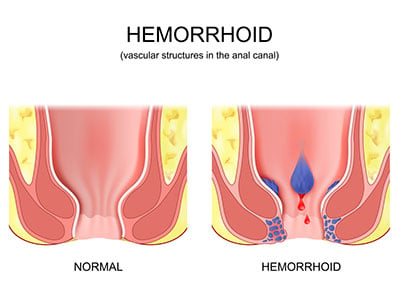Are Hemorrhoids a Warning Sign of Anal Cancer?

The main warning signs of anal cancer are rectal pain, itching and bleeding and changes in bowel movements, such as unusually narrow stools. Hemorrhoids, which are painful clusters of inflamed veins in the rectum and anus, can produce many of the same symptoms. Although hemorrhoids are not usually a precursor to anal cancer—and are also far more common—these symptoms should still be promptly brought to the attention of a physician.
What causes hemorrhoids?
 Rather than having one specific cause, hemorrhoids usually result from the interplay of several factors, which may include:
Rather than having one specific cause, hemorrhoids usually result from the interplay of several factors, which may include:
- Straining during bowel movements
- Sitting on a toilet for a prolonged period
- Chronic diarrhea or constipation
- A low-fiber diet
- Obesity or excess body weight
- Pregnancy (an enlarged uterus can press on nearby veins)
The common denominator of many of these factors is the potential for interference with blood circulation to the rectum and anus. As blood pools in this area, it can cause blood vessels to become inflamed and enlarged. Also, the connective tissues that support the veins in the rectum and anus can weaken over time, allowing the veins to bulge outward. For this reason, the likelihood of developing hemorrhoids increases with age.
How to tell if you have hemorrhoids or anal cancer

The only way to truly distinguish symptoms caused by hemorrhoids from those caused by anal cancer is to consult with a trained medical practitioner who can provide an accurate diagnosis. In the meantime, here are some circumstances that would likely point to the presence of hemorrhoids rather than anal cancer:
- You have one or more risk factors for hemorrhoids. The risk factors for hemorrhoids include pregnancy, obesity, a low-fiber diet, heavy lifting, receptive anal intercourse, chronic constipation, chronic diarrhea, straining during bowel movements and sitting on the toilet for an extended time.
- You can see what appears to be a hemorrhoid. If you hold a mirror up to your anus, you may be able to see a hard, red and possibly mucus-covered lump. You might also see a group of soft lumps situated close together.
- Your symptoms fluctuate. Hemorrhoids are often episodic and flare up in response to certain factors, such as straining during bowel movements. Just be sure to watch for worsening or additional symptoms, which could be a sign of anal cancer or another serious condition.
- At-home remedies ease your symptoms. Usually, hemorrhoid symptoms quickly improve with appropriate care. For instance, you may benefit from increasing your fiber intake, taking a pain reliever, applying hemorrhoid cream or another topical treatment or soaking in a bathtub or sitz bath.
Benefit from world-class care at Moffitt Cancer Center
At Moffitt, we take the signs of anal cancer very seriously, and so should you. We encourage you to discuss any symptoms with a specialist in our Gastrointestinal Oncology Program, and you don’t need a referral to do so. We will begin the diagnostic process right away, and if you are ultimately diagnosed with anal cancer, we can create an individualized treatment plan to help you achieve the best possible outcome and quality of life.
To request an appointment at Moffitt, call 1-888-663-3488 or submit a new patient registration form online.
